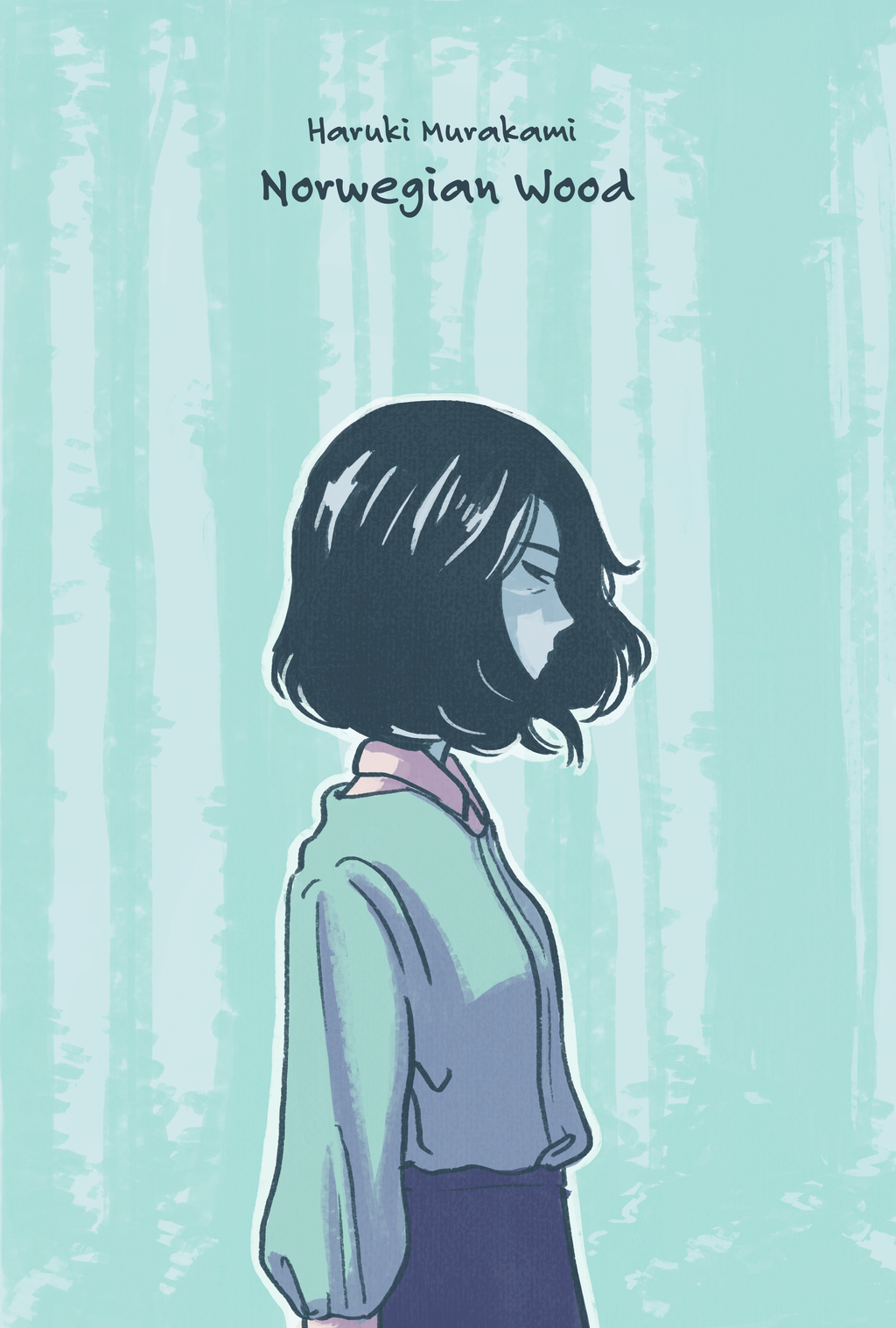I once had a girl
Or should I say
She once had me?
I heard about both the song Norwegian Wood by the Beatles and the novel by Murakami long ago. During my young age, the song to me was… meh (I was no Beatles fan, and even now, I am not). The novel, as the adults told me, was so sexually explicit that it should not be read then, and it should not be read now because it was a “corrupted form of literature” from the debauched Western world. Now, as I understand the true nature of those “men of dignity” who only focus on the sexes of Murakami’s work and portrayed Norwegian Wood as a dirty pornography novel, I came to the conclusion that it is their minds that are corrupted and filled with nasty sensual fantasy, intoxicating the younger generation the harder they try to suppress sex. No longer being constrained by the petty morality of my culture, I opened myself to the vast world of human emotions portrayed in literary works and other forms of arts. Norwegian Wood evidently earned its place on my reading list but as five years went by, I gradually forgot about it. The recent motivation for me to read the novel only because I received it as a parting gift. From M.
I met M. in the Environmental Philosophy class sometimes in January 2017. The half-Vietnamese girl did not seem to be one of the brightest students in the classroom but the more we talked (she started the conversation), the more she revealed her exceptional intellect and deep reasoning capacity behind the disguise of a carefully fortified appearance of a typical Asian girl at UBC. She reminded me of R., the ones who love asking big questions about the universe, yet only to whom they think a good fit as a “grand parleur.” I enjoyed talking to M. as if the reason is not that my mind is continuously seeking for another great one to chat with. Sadly, our verbal adventures would come to an end. In the contemporary time, we tend to be overwhelmed by things that are far more important than philosophical talks. Good grades to maintain, jobs to do, and future careers to prepare. Even M. agreed. She planned an exchange study trip to Peru during the summer of 2017. Before we parted, M. and I had an informal book exchange. I gave her an academic-related book, “Prisoners of Geography” by Tim Marshall (relating to her study, which was about geopolitics) and in exchange, she gave me Norwegian Wood by Haruki Murakami, with a suggestion that I should decode the meaning of this book. Then, we parted. As it is going to show, our paths will never cross again.
Then, I began reading Norwegian Wood.

Interestingly enough, the novel’s name Norwegian Wood, published in 1987, was indeed inspired by the Beatles song with the same title, released two decades ago in 1965. The song describes John Lennon’s extramarital affair. Obviously, the song depicts an intense desire for sex (of the male protagonist). As the girl invites the protagonist (Lennon himself) to her room, in which the wall panel was made out of Norwegian wood, the protagonist is pleased because, at that time (the social, cultural, sexual revolution in the late 1960s and early 1970s), Norwegian pine was likely used by London swinging girls to decorate their rooms and indicate a strong sex life. In addition to that, there was no chair in the room, which suggests they both have to sit on her bed, further consolidating his expectation for sex. When she gets the man’s hope as high as she could, the plot twist is dropped on his head, knocking him out of his fantasy: she wants to go to bed (without him) because she has work tomorrow; so, the man of the story has to sleep in the bath tub instead. In the morning after, he wakes up only to find out she is gone (“this bird had flown”). In the end, he lights a fire, implicitly implying an act of arson and remarking how well her Norwegian wood-made room burns. Norwegian Wood (song) was so influential worldwide not because it marked the turning point of the Beatles from folk-style ballads to a more adult-engaging style, in which sexual liberation (basically anything that was going on in the late 1960s, including, but not limited to, anti-war/anti-established order movement, drug uses, environmentalism, LGBT), but also because of its revolutionary use of Indian classical instrument (the sitar) which later on became popular in Western society. On the other hand, my mediocre taste in music fails to grasp the greatness of Norwegian Wood. Above all, I think the story behind the song is hilarious (a man invited to a worldly urban woman, all the evidence suggesting he is going to have a delightful sex night, but the plot twist completely kills his mood, THEN the poor man sleeps in a bath tub until the morning after and lights her room on fire – the whole thing, to me, is funny as hell). But most Beatles listeners associate the genius of the song to a sense of sadness, hopelessness, abandonment, and an unsatisfied sexual demand. As it turns out, Murakami was inspired by this song and wrote the whole novel with identical themes. In the novel Norwegian Wood, the song is constantly presented throughout the story, whenever the mood indicates sadness and loneliness. In an as-gloomy-as-possible fashion, the song becomes the background for depicting the thirst for sex but somehow such goal is unreachable and unsatisfiable.
 The whole novel is a nostalgic story told by the 37-year-old Wanatabe, retelling his youth at the age of 20 taken place in the late 1960s. The young Wanatabe, just like pretty much of the Western world at that time, experiences a sexual revolution. In a traditional and conservative culture like Japan, allowing such sexually-liberalizing generation taking over seems to me an unthinkable peculiar social transformation. (Or is it? It is not difficult to find a counter-argument for my remark because there is plenty of evidence suggesting the liberalization of sex has been occurring in Japanese society for centuries as shown in old paintings and historical records, hence, I may be wrong). The protagonist, also the narrator is Toru Wanatabe, a not-so-special student. Things change when his best friend, Kizuki, commits suicide, leaving his heartbroken girlfriend Naoko and his best friend Wanatabe behind. As the story progresses, the two try to help each other to cope with the reality of losing their loved one. Naoko becomes a victim of severe depression while Wanatabe finds a temporary escape from his sorrow by seeking one-night stands. As Wanatabe falls in love with the mentally troubled Naoko, he is also attached to Midori, a girl of his age who has a sexually-liberated mind. (This is where things get complicated and no, evidently what makes the novel famous is not about how this love triangle plays out, or how the sexes are the primary factors that attract audiences). Naoko’s depression gets worse, and she has to move to a sanatorium for her treatment, away from the healthy society. Wanatabe, on the other hand, lives a purposeless life without Naoko and his ill-fated friend but still manages to satisfy his ego through sexes. He has the will to live, to take care of Naoko. When the two are always haunted by the death of Kizuki, Wanatabe and Naoko approach each other, attempting to bury the grief through the interconnectedness of their bodies and hoping that sex could liberate them from the real dark world and that they would find a new purpose to love and to live. Both are wrong. The character Wanatabe does not look like a womanizer who is so desperate to sleep with girls. After some one-night stands, Wanatabe soon realizes these sexes mean nothing without love. He sees the value of being human through not being selfish to his own sexual instinct; his human-ness, thus, extends to the ability to love and care for someone, which is Naoko and later on, Midori. On the contrary, Naoko suffers from depression, blaming herself for not having the capacity to love Wanatabe despite the sex. Midori is different. She is the only firecracker that lightens up the permanently dark world in Norwegian Wood. While being incredibly easy in approaching sex, Midori maintains the positiveness when coping with deaths surrounding her life (the deaths of parents), and unlike Naoko or Wanatabe, she spends only a little time to grieve her losses. Instead, she actively seeks a purpose to live: the love with Wanatabe and to a greater extent, exploring sex life. The novel ends abruptly with the suicide of Naoko, and in the final scene, Wanatabe calls Midori from an unknown place, asking for her love, only to find himself “phased out” of space and time, and “all that flashed into [Toru’s] eyes were the countless shapes of people walking by to nowhere.”
The whole novel is a nostalgic story told by the 37-year-old Wanatabe, retelling his youth at the age of 20 taken place in the late 1960s. The young Wanatabe, just like pretty much of the Western world at that time, experiences a sexual revolution. In a traditional and conservative culture like Japan, allowing such sexually-liberalizing generation taking over seems to me an unthinkable peculiar social transformation. (Or is it? It is not difficult to find a counter-argument for my remark because there is plenty of evidence suggesting the liberalization of sex has been occurring in Japanese society for centuries as shown in old paintings and historical records, hence, I may be wrong). The protagonist, also the narrator is Toru Wanatabe, a not-so-special student. Things change when his best friend, Kizuki, commits suicide, leaving his heartbroken girlfriend Naoko and his best friend Wanatabe behind. As the story progresses, the two try to help each other to cope with the reality of losing their loved one. Naoko becomes a victim of severe depression while Wanatabe finds a temporary escape from his sorrow by seeking one-night stands. As Wanatabe falls in love with the mentally troubled Naoko, he is also attached to Midori, a girl of his age who has a sexually-liberated mind. (This is where things get complicated and no, evidently what makes the novel famous is not about how this love triangle plays out, or how the sexes are the primary factors that attract audiences). Naoko’s depression gets worse, and she has to move to a sanatorium for her treatment, away from the healthy society. Wanatabe, on the other hand, lives a purposeless life without Naoko and his ill-fated friend but still manages to satisfy his ego through sexes. He has the will to live, to take care of Naoko. When the two are always haunted by the death of Kizuki, Wanatabe and Naoko approach each other, attempting to bury the grief through the interconnectedness of their bodies and hoping that sex could liberate them from the real dark world and that they would find a new purpose to love and to live. Both are wrong. The character Wanatabe does not look like a womanizer who is so desperate to sleep with girls. After some one-night stands, Wanatabe soon realizes these sexes mean nothing without love. He sees the value of being human through not being selfish to his own sexual instinct; his human-ness, thus, extends to the ability to love and care for someone, which is Naoko and later on, Midori. On the contrary, Naoko suffers from depression, blaming herself for not having the capacity to love Wanatabe despite the sex. Midori is different. She is the only firecracker that lightens up the permanently dark world in Norwegian Wood. While being incredibly easy in approaching sex, Midori maintains the positiveness when coping with deaths surrounding her life (the deaths of parents), and unlike Naoko or Wanatabe, she spends only a little time to grieve her losses. Instead, she actively seeks a purpose to live: the love with Wanatabe and to a greater extent, exploring sex life. The novel ends abruptly with the suicide of Naoko, and in the final scene, Wanatabe calls Midori from an unknown place, asking for her love, only to find himself “phased out” of space and time, and “all that flashed into [Toru’s] eyes were the countless shapes of people walking by to nowhere.”
The novel’s ending is vague and intentionally left open-ended. Many argue that the whole set is about action and reaction: Naoko collapses because of Kizuki’s death, the “death” is transferred to Naoko, thus explaining her severe depression and suicidal tendency so Wanatabe steps in to fill in the gap. When Naoko commits suicide as well, the “death” is then transferred to Wanatabe himself, and he too tries to reach out to Midori, only to find himself “phased out,” or detach from the reality of the livings.

Culturally and socially, sex is not a topic encouraged to talk about. To some extent, sex before marriage or an extramarital affair are viewed with disgust, disgrace and impurity, particularly the ones in this novel. However, Murakami succeeds in making the audiences ask the question: to what extent that sex is justifiable and if it should be justified at all. The sexes in Norwegian Wood act as counterweights to death, the idea that presents substantially because sex represents the impulse to live, and perhaps to a larger extent, pregnancy and giving birth are the start of life (although no pregnancy is ever mentioned in the novel). And because death is everywhere in Norwegian Wood, the sex would also sustain an incessant existence, to the degree where one would ask if it is necessary to justify sexes in this novel anymore. For instance, after learning about the death of Naoko, Wanatabe has sexual intercourse with Reiko, a woman in her late thirties and also Naoko’s roommate in the sanitorium. I scream “WHAT?!” really loud in my inner mind at this part because it makes no sense: why, of all the sudden and how, of the non-traditional sexual relationship that is so criticizable, that this sex scene exists? But after a moment of comprehension, I thought to myself, “does it matter?” The genius of Murakami has brought this eventual remark among readers.
In connection to the Beatles song, the novel emphasizes the desire for sex and that sex is a form of personal redemption. Then, when both do not work out, the poor men (Lennon or Wanatabe) has to find an alternative path to free himself from the collapse of unmet sexual demand. To Wanatabe, he seeks for the fire of love from Midori and to Lennon, he sets the Norwegian-wood room on fire.
Now, come to think of it, I wonder if the Japanese actually perceive sex as a temporary escape from the unpleasant reality. Why? Because, obviously, during sex, what else would you think about? The brief moment of not thinking about daily hassles while having sex has been the pretext for prostitution, brothel, and countless literature works for hundreds, if not thousands of years. When it comes to contemporary Japanese society, this perception seems to have a stand. The highly-competitive environment of Japan easily alienates individuals making them feel left out. In fact, depression and suicide are not rare, as if Murakami just delivers a description of contemporary Japan through his novel Norwegian Wood. Having said that, there has to be a correlation between the aging demography of Japan, the lack of interest in sex, and the growth of Japanese porn industry and sex-related products.
I’m excited to uncover this website. I want to to thank you for your time due to this fantastic read!! I definitely really liked every part of it and I have you book-marked to see new information in your site.
This made me want to read the book again?!!!
HI iam deepak form diginewsindia is one of the best blogs and news websites of reading tranding news of topics
https://diginewsindia.com/
I stumbled upon this blog while re-searching for the meaning behind the last sentence of Norwegian Wood (song) – this bird has flown. The information and discussion you just put forward is all amazing. As both a Beatles’ fan and a person who enjoys Norwegian Wood by Murakami, I just wanna say I am happy to have found this blog
The Australia PR points calculator is used to assess your eligibility and allot points depending on various factors, and it is important for you to check your eligibility via the PR points calculator that gives accurate results.